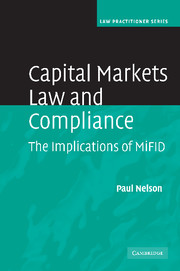Book contents
- Frontmatter
- Contents
- Preface
- List of acronyms
- Part I Evolution of capital markets regulation, FSA and the European single market
- Part II Licensing and rule application
- Part III The firm's infrastructure
- Part IV Conduct of business
- 8 Client classification and client documentation
- 9 Principles of conduct
- 10 Marketing investments
- 11 Advising clients
- 12 Improper behaviour in dealing and executing orders
- 13 Dealing and executing orders
- 14 Exchanges and MTFs
- Part V Application of rules to particular businesses
- Bibliography
- Index
14 - Exchanges and MTFs
Published online by Cambridge University Press: 03 December 2009
- Frontmatter
- Contents
- Preface
- List of acronyms
- Part I Evolution of capital markets regulation, FSA and the European single market
- Part II Licensing and rule application
- Part III The firm's infrastructure
- Part IV Conduct of business
- 8 Client classification and client documentation
- 9 Principles of conduct
- 10 Marketing investments
- 11 Advising clients
- 12 Improper behaviour in dealing and executing orders
- 13 Dealing and executing orders
- 14 Exchanges and MTFs
- Part V Application of rules to particular businesses
- Bibliography
- Index
Summary
Regulated markets
MiFID allows regulated markets to themselves ‘passport’ by setting up branches in other Member States and allowing remote membership to firms from other Member States (MiFID Art. 33). As a result, there are detailed requirements as to authorisation of such markets, their controllers and systems and controls, trading of financial instruments, access rights and socalled ‘pre-trade transparency’, i.e. publication of bid and offer prices, and ‘post-trade transparency’ (13.4.1) (MiFID Arts. 33–47; Level 2 Regulation).
Transactions between members of regulated markets are not themselves subject to most of the conduct rules (COBS 1, Ann. 1, Part 5, para. 4.1).
Multi-lateral Trading Facilities (Alternative Trading Systems)
The need for separate regulation
The operator of an ATS or MTF always required a license/authorisation under FSMA and its predecessor 1986 FSAct (3.2.2.7) and, accordingly, if operated by an Exchange, came within its exempt ‘recognised investment exchange’ (RIE) status (FSMA 285) or, if operated by a firm, under its general authorisation. However, because they were really quasi-exchanges, FSA perceived that such systems ‘pose risks to our … objectives’ (2.5.1), all of market confidence (‘little public transparency of ATS activity leading to possible inefficiencies in the price formation process and so higher trading costs; variations in the extent to which operators comply with good practice in systems and controls, the monitoring of user activity, and arrangements for reporting of suspect transactions; and the possibility of traders trading in transparent markets on the basis of information from trades only known to direct users of non-transparent ATSs, to the disadvantage of participants in the wider market’), consumer protection (‘best executionwhere some activity is conducted on non-transparent ATSs’)
- Type
- Chapter
- Information
- Capital Markets Law and ComplianceThe Implications of MiFID, pp. 418 - 422Publisher: Cambridge University PressPrint publication year: 2008
- 1
- Cited by



